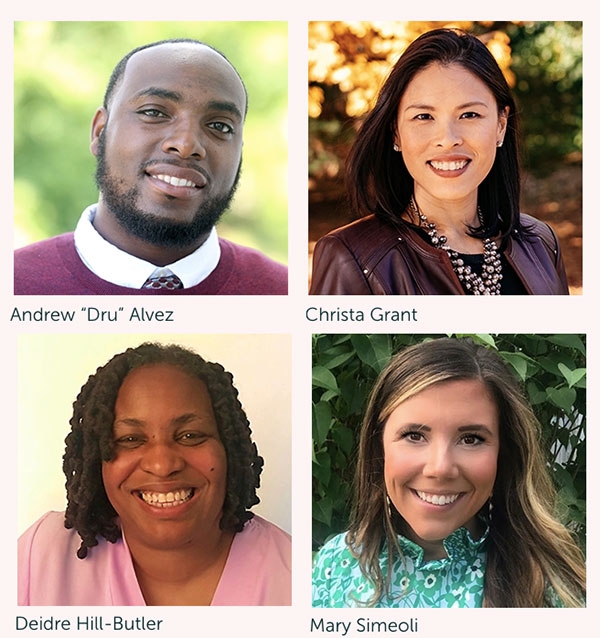President David Harris has announced the creation of a four-member leadership team and a number of initiatives aimed at enhancing diversity and inclusion.
Members of the Diversity Leadership Team are:
- Andrew “Dru” Alvez will assume the position of assistant director of intercultural affairs, responsible for the success and well-being of students of color and marginalized communities.
- Christa Grant, will be assistant dean for intercultural affairs, responsible for all aspects of student affairs programming aimed at fostering a community of diversity and inclusion.
- Deidre Hill Butler, associate professor of sociology, will be academic chief diversity officer, responsible for leading faculty and curricular matters.
- Mary Simeoli, Title IX Coordinator, will add the role of interim director of equal opportunity to foster a supportive environment for all members of the Union community.
“I thank Dru, Christa, Deidre and Mary for leading these important initiatives,” Harris wrote in an email the Union community. “In the weeks, months and years ahead, I look forward to working with them and all of you to create and sustain a campus environment that is even more consistent with our ideals.”
“Over the last several months, as our nation and the Schenectady community have grappled with difficult issues over race, power and privilege, I have been inspired by the reaction of the Union community to address these issues here on campus and beyond,” Harris said.
After the murder of George Floyd, members of the Union community participated in a forum on racial justice. Over the summer, the President’s Initiative on Race, Power and Privilege (RPP) was launched. A group of 40 students, faculty, staff, and alumni met weekly. They identified and discussed five key areas: cultural competency, curricular change, faculty and staff diversity, campus safety and increased support for Black, Indigenous and People of Color (BIPOC) students.
Harris cited several recommendations from the committee:
- Enhance formal and informal actions to build connections between Campus Safety officers and students across campus;
- Launch peer facilitator programs and diversity and inclusion workshops for students, staff and faculty; and
- Develop curricular and co-curricular requirements for students to explore issues of race, power and privilege.
“It is clear that while we have taken action in many areas , there is still much to do,” Harris said. “It is also clear that we must acknowledge that at Union we are not starting from a neutral place and that our past has consequences.”
Harris noted that, like many institutions, Union’s conception of inclusion has been historically narrow. Founded by Protestant denominations, Union was for long a college for white men with students of color appearing rarely before the 1960s and women not admitted until 1970. More recently, he added, LGBTQ+ students have become more visible.
“We acknowledge that some have not thrived at Union, and for that, our culture, policies and history must bear some responsibility,” he said. “Even when dreams have been realized, it has often required more stress and tenacity for some than for others. For all the ways in which our institution could and should have served our students, faculty and staff better, we apologize.”
Harris concluded: “This effort will make us all uncomfortable in different ways and at different times, as it should. I am confident that with wisdom, empathy and courage we will not only live up to our name, but become a model for every college that is facing challenging issues that have plagued our country for over 400 years.”
